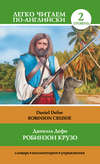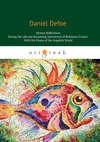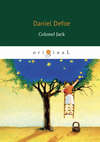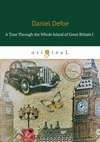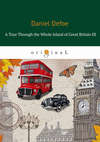Read the book: «The Life and Most Surprising Adventures of Robinson Crusoe, of York, Mariner (1801)», page 15
"In fighting these two battles, we were so much tired, that we did not then trouble ourselves to pursue them to their canoes, in which we thought they would presently put to the ocean; but their happening a dreadful storm at sea, which continuing all that night, it not only prevented their voyage, but dashed several of their boats to pieces against the beach, and drove the rest so high upon the shore, that it required infinite labour to get them off. After our men had taken some refreshment and a little repose, they resolved early in the morning to go towards the place of their landing, and see whether they were gone off, or in what posture they remained. This necessarily led them to the place of battle, where several of the savages were expiring, a sight no way pleasing to generous minds, to delight in misery, though obliged to conquer them by the law of arms; but our own Indian slaves put them out of their pain, by dispatching them with their hatchets. At length, coming in view of the remainder of the army, we found them leaning upon their knees, which were bended towards their mouth, and the head between the two hands. Hereupon, coming within musket shot of them, I ordered two pieces to be fired without ball, in order to alarm them, that we might plainly know, whether they had the courage to venture another battle, or were utterly dispirited from such an attempt, that so we might accordingly manage them. And indeed, the prospect took very well; for, no sooner did the savages hear the first gun, and perceive the flash of the second, but they suddenly started upon their feet in the greatest consternation; and when we approached towards them, they ran howling and screaming away up the hill into the country.
"We could rather, at first, have wished, that the weather had permitted them to have gone off to the sea; but when we considered, that their escape might occasion the approach of multitudes, to our utter ruin and dissolution; we were very well pleased the contrary happened; and Will Atkins (who, tho' wounded, would not part from us all this while) advised us not to let slip this advantage, but clapping between them and their boats, deprive them of the capacity of ever returning to plague the island: I know, said he, there is but on objection you can make, which is, that these creatures, living like beasts in the wood, may make excursions, rifle the plantations, and destroy the tame goats; but then, consider, we had better to do with an hundred men whom we can kill, or make slaves of at leisure, than with an hundred nations, whom it is impossible we should save ourselves from, much less subdue. This advice, and these arguments being approved of, we set fire to their boats; and though they were so wet that we could not burn them entirely, yet we made them incapable for swimming in the seas. As soon as the Indians perceived what we were doing, many of them ran out of the woods, in fight of us, and kneeling down, piteously cried out, Oa, Oa! Waramakoa. Intimating, I suppose, that, if we would but spare their canoes, they would never trouble us again.
"But all their complaints, submissions, and entreaties, were in vain; for self-preservation obliging us to the contrary, we destroyed every one of them that had escaped the fury of the ocean. When the Indians perceived this, they raised a lamentable cry, and ran into the woods, where they continued ranging about; making the woods ring with their lamentation. Here we should have considered, that making these creatures, thus desperate, we ought, at the same time to have set a sufficient guard upon the plantations: for the savages, in their ranging about, found out the bower, destroyed the fences, trod the corn down under their feet, and tore up the vines and grapes. It is true, we were always able to fight these creatures; but, as they were too swift for us, and very numerous, we durst not go out single, for fear of them; though that too was needless, they having no weapons, nor any materials to make them; and, indeed, their extremity appeared in a little time after.
"Though the savages, as already mentioned, had destroyed our bower, and all our corns, grapes, &c. yet we had still left our flock of cattle in the valley, by the cave, with some little corn that grew there, and the plantation of Will Atkins and
his companions, one of whom being killed by an arrow, they were now reduced to two: it is remarkable that this was the fellow who cut the poor Indian with his hatchet, and had design to murder me and my countrymen the Spaniards. As our condition was low, we came to the resolution to drive the savages up to the farther part of the island, where no Indians landed, to kill as many of them as we could, till we had reduced their number; and then to give the remainder some corn to plant, and to teach them how to live by their daily labour, accordingly we pursued them with our guns, at the hearing of which they were so terrified, that they would fall to the ground. Every day we killed and wounded some of them, and many were found starved to death, so that our hearts began to relent at the sight of such miserable objects. At last, with great difficulty, taking one of them alive, and using him with kindness, & tenderness, we brought him to Old Friday, who talked to him, & told him how good we would be to them all, giving them corn and land to plant and live in, and present nourishment, provided they should keep within such bounds as should be allotted them, and not do prejudice to others: Go then, said he, and inform your countrymen of this; which, if they will not agree to, every one of them shall be slain.
"The poor creatures, thoroughly humbled, being reduced to about thirty-seven, joyfully accepted the offer, and earnestly begged for food; hereupon we sent twelve Spaniards and two Englishmen well armed, together with Old Friday, and three Indian slaves were loaded with a large quantity of bread and rice cakes, with three live goats: and the poor Indians being ordered to sit down on the side of the hill, they ate the victuals very thankfully, and have proved faithful to the last, never trespassing beyond their bounds, where at this day they quietly and happily remain, and where we now and then visit them. They are confined to a neck of land about a mile and a half broad, and three or four in length, on the south-east corner of the island, the sea being before, and lofty mountains behind them, free from the appearance of canoes; and indeed their countrymen never made any inquiry after them. We gave them twelve hatchets, and three or four knives; have taught them to build huts, make wooden spades, plant corn, make bread, breed tame goats and milk them, as likewise to make wicker work, in which I must ingenuously confess, they infinitely out do us, having made themselves several pretty necessaries and fancies, as baskets, sieves, bird-cages, and cupboards, as also stools, beds and couches, no less useful than delightful; and now they live the most innocent and inoffensive creatures that ever were subdued in the world, wanting nothing but wives to make them a nation.
"Thus, kind Sir, have I given you, according to my ability, an impartial account of the various transactions that have happened, in the island since your departure to this day; and we have great reason to acknowledge the kind providence of Heaven in our merciful deliverance. When you inspect your little kingdom, you will find in it some little improvement, your flocks increased, and your subjects augmented, so that from a desolate island, as this was before your wonderful deliverance upon it, here is a visible prospect of its becoming a populous and well governed little kingdom, to your immortal fame and glory."
There is no doubt to suppose but that the preceeding relation of my faithful Spaniard was very agreeable and no less surprising to me, to the young priest, and to all who heard it: now were these people less pleased with those necessary utensils that I brought them, such as the knives, scissars, spades, shovels, and pick-axes, with which they now adorn their habitations.
So much had they addicted themselves to wicker-work, prompted by the ingenuity of the Indians, who assisted them, that when I viewed the Englishmen's colonies, they seemed at a distance as though they had lived like bees in a hive: for Will Atkins, who was now become a very industrious and sober man, had made himself a tent of basket-work round the outside; the walls were worked in as a basket, in pannels or strong squares of thirty-two in number, standing about seven feet high: in the middle was another, not above twenty-two paces round, but much stronger built, being of an octagonal form, and in the eight corners stood eight strong poles, round the top of which he raised a pyramid for the roof, mighty pretty, I assure you, and joined very well together, with iron spikes, which he made himself; for he had made him a forge, with a pair of wooden bellows and charcoal for his work, forming an anvil cut of one of the iron crows, to work upon, and in the manner would he make himself hooks, staples, spikes, bolts, and hinges. After he had pitched the roof of his innermost tent, he made it so firm between the rafters with basket-work, thatching that over again with rice-straw, and over that a large leaf of a tree, that his house was as dry as if it had been tiled or slated. The outer circuit was covered as a lean-to, quite round this inner appartment, laying long rafters from the thirty-two angles to the top posts of the inner house, about twenty-feet distant, so that there was a space like a wall between the outer and inner wall, near twenty feet in breadth. The inner place he partitioned off with the same wicker-work, dividing it into six neat apartments every one of which had a door, first into the entry of the main tent, and another into the space and walk that was round it, not only convenient for retreat, but for family necessaries. Within the door of the outer circle, there was a passage directly to the door of the inner house; on either side was a wicker partition, and a door, by which you go into a room twenty-two feet wide, and about thirty long, and through that into another of a smaller length; so that in the outer circle were ten handsome rooms, six of which were only to be come at through the apartments of the inner tent, serving as retiring rooms to the respective chambers of the inner circle, and four large warehouses, which went in through one another, two on either hand of the passage that led through the outer door to the inner tent. In short, nothing could be built more ingeniously, kept more neat, or have better conveniences; and here lived the three families, Will Atkins, his companion, their wives and children, and the widow of the deceased. As to religion, the men seldom taught their wives the knowledge of God, any more than the sailors' custom of swearing by his name. The greatest improvement their wives had, was, they taught them to speak English, so as to be understood.
None of their children were then above six years old; they were all fruitful enough; and I think the cook's mate's wife was big of her sixth child.
When I inquired of the Spaniards about their circumstances while among the savages, they told me, that they abandoned themselves to despair, reckoning themselves a poor and miserable people, that had no means put into their hands, and consequently must soon be starved to death. They owned, however, that they were in the wrong to think so, and for refusing the assistance that reason offered for their support, as well as future deliverance, confessing that grief was a most insignificant passion, as it looked upon things as without remedy, and having no hope of things to come; all which verified this noted proverb,
In trouble to be troubled,
Is to have your trouble doubled.
Nor did his remarks end here, for, making observations upon my improvement, and on my condition at first, infinitely worse than theirs, he told me that Englishmen had, in their distress, greater presence of mind than those of any other country that he had met with; and that they and the Portuguese were the worst men in the world to struggle under misfortunes. When they landed among the savages, they found but little provision except they would turn cannibals, there being but a few roots and herbs, with little substance in them, and of which the natives gave them but very sparingly. Many were the ways they took to civilize and teach the savages, but in vain; for they would not own them to be their instructors, whose lives were owing to their bounty. Their extremities were very great and many days being entirely without food, the savages there being more indolent and less devouring than those who had better supplies. When they went out to battle they were obliged to assist these people, in one of which my faithful Spaniard being taken, had like to have been devoured. They had lost their ammunition, which rendered their fire-arms useless; nor could they use the bows and arrows that were given them, so that while the armies were at a distance, they had no chance but when close, then they could be of service with halberts, & sharpened sticks put into the muzzles of their muskets. They made themselves targets of wood covered with the skins of wild beasts; and when one happened to be knocked down, the rest of the company fought over him till he recovered; and then standing close in a line, they would make their way through a thousand savages. At the return of their friend, who they thought had been entombed in the bowels of their enemies, their joy was inconceivable. Nor were they less surprised at the sight of the loaves of bread I had sent them, things that they had not seen for several years, at the same time crossing and blessing it, as though it was manna sent from Heaven: but when they knew the errand, and perceived the boat which was to carry them back to the person and place from whence such relief came, this struck them with such a surprise of joy as made some of them faint away, and others burst out into tears.
This was the summary account that I had from them. I shall now inform the reader what I next did for them, and in what condition I left them. As we were all of opinion that the savages would scarce trouble them any more, so we had no apprehensions on the score. I told them I was come purely to establish, and not to remove them; and upon that occasion, had not only brought them necessaries for convenience and defence, but also artificers, and other persons, both for their necessary employments, and to add to their number. They were altogether when I thus talked to them; and before I delivered to them the stores I brought, I asked them, one by one, if they had entirely forgot their first animosities, would engage in the strictest friendship; and shake hands with one another? On this Will Atkins, with abundance of good humour, said, they had afflictions enough to make them all sober, and enemies enough to make them all friends: as for himself, he would live and die among them, owning that what the Spaniards had done to him, his own mad humour had made necessary for them to do. Nor had the Spaniards occasion to justify their proceeding to me; but they told me, that since Will Atkins had behaved himself so valiantly in fight, and at other times showed such a regard to the common interest of them all, they had not only forgotten all that was past, but thought he ought as much to be trusted with arms and necessaries as any of them, which they testified by making him next in command to the governor: and they most heartily embraced the occasion of giving me this solemn assurance, that they would never separate their interest again, as long as they lived.
After these kind declarations of friendship, we appointed all of us to dine together the next day; upon this I caused the ship's cook and his mate to come on shore for that purpose, to assist in dressing our dinner. We brought from the ship six pieces of beef, and four of pork, together with our punch bowl, and materials to fill it; and in particular I gave them ten bottles of French claret, and ten of English beer, which was very acceptable to them. The Spaniards added to our feast, five. whose kids, which being roasted, three of them were sent as fresh meat to the sailors on board, and the other two we ate ourselves. After our merry and innocent feast was over, I began to distribute my cargo among them. First, I gave them linen sufficient to make every one four shirts, and at the Spaniard's request made them up six. The thin English stuffs I allotted to make every one a light coat like a frock, agreeable to the climate, and left them such a quantity as to make more upon their decay; as also pumps, shoes, hats, and stockings. It is not to be expressed the pleasing satisfaction which sat upon the countenances of these poor men, when they perceived what care I took of them, as if I had been a common father to them all; and they all engaged never to leave the island, till I gave my consent for their departure. I then presented to them the people I brought, viz. the tailor, smith, and the two carpenters; but my Jack-of-all-trades was the most acceptable present I could make them. My tailor fell immediately to work, and made every one of them a shirt; after which, he learned the women how to sew and stitch, thereby to become the more helpful to their husbands. Neither were the carpenters less useful, taking in pieces their clumsy things; instead of which they made convenient and handsome tables, stools, bedsteads, cupboards, lockers, and shelves. But when I carried them to see Will Atkins's basket-house, they owned they never saw such a piece of natural ingenuity before: I am sure, said one of the carpenters, the man that built this has no need of us; you need, Sir, do nothing but give him tools.
I divided the tools among them in this manner: to every man I gave a digging spade, a shovel, and a rake, as having no harrows or ploughs; and to every separate place a pickax, a crow, a broad ax, and a saw, with a store for a general supply, should any be broken or worn out. I left them also nails, staples, hinges, hammers, chisels, knives, scissors, and all sorts of tools and iron work; & for the use of the smith, gave them three tons of unwrought iron, for a supply; and as to arms and ammunition, I stored them even to profusion; or at least to equip a sufficient little army against all opposers whatsoever.
The young man (whose mother was unfortunately starved to death) together with the maid, a pious and well educated young woman, seeing things so well ordered on shore (for I made them accompany me) and considering they had no occasion to go so far a voyage as to the East Indies, they both desired of me, that I would leave them there, and enter them among my subjects. This I readily agreed to, ordering them a plat of ground, on which were three little houses erected, environed with basket-work, pallisadoed like Atkins's and adjoining to his plantation. So contrived were their tents that each of them had a room apart to lodge in, while the middle tent was not only their store-house, but their place for eating and drinking. At this time the two Englishmen removed their habitation to their former place; in that now the island was divided into three colonies: first, Those I have just now mentioned; secondly That of Will Atkins, where there were four families of Englishmen, with their wives and children, the widow and her children; the young man and the maid, who, by the way, we made a wife of before our departure; three savages, who were slaves; the tailor, smith, (who served also as a gunsmith) and my other celebrated person called Jack-of-all-trades. Thirdly, my chief colony, which consisted of the Spaniards, with Old Friday, who still remained at my old habitation, which was my capital city, and surely never was there such a metropolis, it now being hid in so obscure a grove, that a thousand men might have ranged the island a month, and looked purposely for it, without being able to find it, though the Spaniards had enlarged its boundaries, both without and within, in a most surprising manner.
But now I think it high time to speak of the young French priest of the order of St. Benedict, whose judicious and pious discourses, upon sundry occasions, merit an extraordinary observation; nor can his being a French Papist priest, I presume, give offence to any of my readers, when they have this assurance from me, that he was a person of the most courteous disposition, extensive charity, and exalted piety. His arguments were always agreeable to reason, and his conversation the most acceptable of any person that I had ever yet met with in my life.
Sir, said he, to me, one day, since, under God, at the same time crossing his breast, you have not only saved my life; but, by permitting me to go this voyage, have granted me the happiness of free conversation, I think is my duty as my profession obliges me, to save what souls I can, by bringing them to the knowledge of some Catholic doctrine, necessary to salvation; and since these people are under your immediate government, in gratitude, justice, and decency, for what you have done for me, I shall offer no farther points in religion, that what shall merit your approbation. Being a-pleased with the modesty of his carriage, I told him he should not be worse used for being of a different persuasion, if upon that very account, we did not differ in points of faith, not decent in a part of the country where the poor Indians ought to be instructed in the knowledge of the true God, and his Son Jesus Christ. To this he replied, that conversation might easily be separated from disputes; that he would discourse with me rather as a gentleman than a religious: but that, if we did enter upon religious argument, upon my desiring the same, I would give him liberty to defend his own principles. He farther added, that he would do all that became him in his office, as a priest as well as a Christian, to procure the happiness of all that were in the ship: that though he could not pray with, he would pray for us on all occasions; and then he told me several extraordinary events of his life, within a few years past; but particularly in this last, which was the most remarkable: that, in this voyage, he had the misfortune to be five times shipped and unshipped: his first design was to have gone to Martinico; for which, taking ship at St. Malos, he was forced into Lisbon by bad weather, the vessel running aground in the mouth of the Tagus; that from thence he went on board a Portuguese ship, bound to the Madeiras, whose master being but an indifferent mariner, and out of his reckoning, they were drove to Fial, where selling their commodity, which was corn, they resolved to take in their loading at the Isle of May, and to sail to Newfoundland; at the banks of which, meeting a French ship bound to Quebec, in the river of Canada, and from thence to Martinico, in this ship he embarked; the master of which dying at Quebec, that voyage was suspended; and lastly, shipping himself for France, this last ship was destroyed by fire, as before has been related.
At this time we talked no further; but another morning he comes to me, just as I was going to visit the Englishman's colony, and tells me, that as he knew; the prosperity of the island, was my principal desire, he had something to communicate agreeable to my design, by which perhaps he might put it, more than he yet thought it was, in the way of the benediction of heaven. How, Sir, said I, in a surprise, are we not yet in the way of God's blessings, after all these signal providences and deliverances, of which you have had such an ample relation? He replied, Nope, Sir, you are in the way, and that your good design will prosper: but still there are some among you that are not equally right in their actions; and remember, I beseech you, Sir, that Achan, by his crime, removed God's blessing from the camp of the children of Israel; that though six and thirty where entirely innocent, yet they became the object of divine vengeance, and bore the weight of his punishment accordingly.
So sensibly was I touched with this discourse, and so satisfied with that ardent piety that inflamed his soul, that I desired him to accompany me to the Englishman's plantations, which he was very glad of, by reason they were the subject of what he designed to discourse with me about: and while we walked on together, he began in the following manner:
"Sir, said he, I must confess it as a great unhappiness that we disagree in several doctrinal articles of religion; but surely both of us acknowledge this, that there is a God, who having given us some stated rules for our service and obedience, we ought not willingly and knowingly to offend him; either by neglecting what he has commanded, or by doing what he has forbidden. This truth every Christian owns, that when any one presumptuously sins against God's command, the Almighty then withdraws his blessing from him; every good man therefore ought certainly to prevent such neglect of, or sin against, God and his commands." I thanked the young priest for expressing so great a concern for us, and desired him to explain the particulars of what he had observed, that according to the parable of Achan, I might remove the accursed thing from among us "Why then, Sir, said he, in the first place, you have four Englishmen, who have taken savage women to their wives, by whom they have several children, though none of them are legally married, as the law of God and man requires; they, I say, Sir, are no less than adulterers, and as they still live in adultery, are liable to the curse of God. I know, Sir, you may object the want of a priest or clergyman of any kind; as also, pen, ink and paper, to write down a contract of marriage, and have it signed between them. But neither this, nor what the Spanish governor has told you of their choosing by consent, can be reckoned a marriage, nor any more than an agreement to keep them from quarrelling among themselves; for, Sir, the essence or sacrament of matrimony (so he called it) not only consists in mutual consent, but in the legal obligation, which compels them to own and acknowledge one another, to abstain from other persons, the men to provide for their wives and children, and the woman to the same and like conditions, nutatis mutandis, on their side: whereas, Sir, these men, upon their own pleasure, on any occasion, may forsake those women and marry others, and by disowning their children, suffer them utterly to perish. Now, Sir, 'added he, 'can God be honoured in such an unlawful liberty as this; how can a blessing succeed to the best endeavours, if men are allowed to live in so licentious a way?" I was indeed struck with the thing myself, and thought that they were much to blame, that no formal contract had been made, though it had been but breaking a stick between them, to engage them to live as man and wife, never to separate, but love, cherish, and comfort one another all their lives; yet Sir, said I, when they took these wommen, I was not here, and if it is adultery, it is past my remedy, and I cannot help it. "True, Sir,' answered the young priest. you cannot be charged with that part of the crime which was done in your absence: but I beseech you, don't flatter yourself, that you are under no obligation now to put a period to it: which if you neglect to do, the guilt will be entirely on you alone, since it is certainly in nobody's power but yours, to alter their condition." I must confess, I was so dull, that I thought he meant, I should part them, and knowing that this would put the whole island in confusion, I told him, I could not consent to it upon any account whatsoever. "Sir,' said he, in a great surprise, 'I do not mean that you should separate, but marry them, by a written contract, signed by both man and woman, and by all the witnesses present, which all the European laws decree to be of sufficient efficacy." Amazed with such true piety and sincerity, and considering the validity of a written contract, I acknowledged all that he said to be very just and kind, and that I would discourse with the man about it; neither could I see what reason they could have not to let him marry them, whose authority in that affair is owned to be as authentic as if they were married by any of our clergymen in England.
The next complaint he had to make to me was this, that though these English subjects of mine have lived with these women seven years, and though they were of good understanding, and capable of instruction, having learned not only to speak, but to read English, yet all this while they had never taught them any thing of the Christian religion, or the knowledge of God, much less in what manner he ought to be served. "And is not this an unaccountable neglect:' said he warmly. 'Depend upon it, God Almighty will call them to account for such contempt. And though I am not of your religion, yet I should be glad to see these people released from the devil's power, and be saved by the principles of the Christian religion, the knowledge of God, of a Redeemer, the resurrection, and of a future state. But as it is not too late, if you please to give me leave to instruct them, I doubt not but I shall supply this great defect, by bringing them into the great circle of Christianity, even while you continue in the island."
I could hold no longer, but embracing him, told him, with a thousand thanks, I would grant whatever he requested, and desired him to proceed in the third article, which he did in the following manner;
"Sir,' said he, 'it should be a maxim among all Christians, that Christian knowledge ought to be propagated by all possible means, and on all occasion. Upon this account our church sends missionaries into Persia, India, and China, men who are willing to die for the sake of God & the Christian faith, in order to bring poor infidels into the way of salvation. Now, Sir, as here is an opportunity to convert seven & thirty poor savages, I wonder how you can pass by such an occasion of doing good, which is really worth the expence of a man's whole life."
















